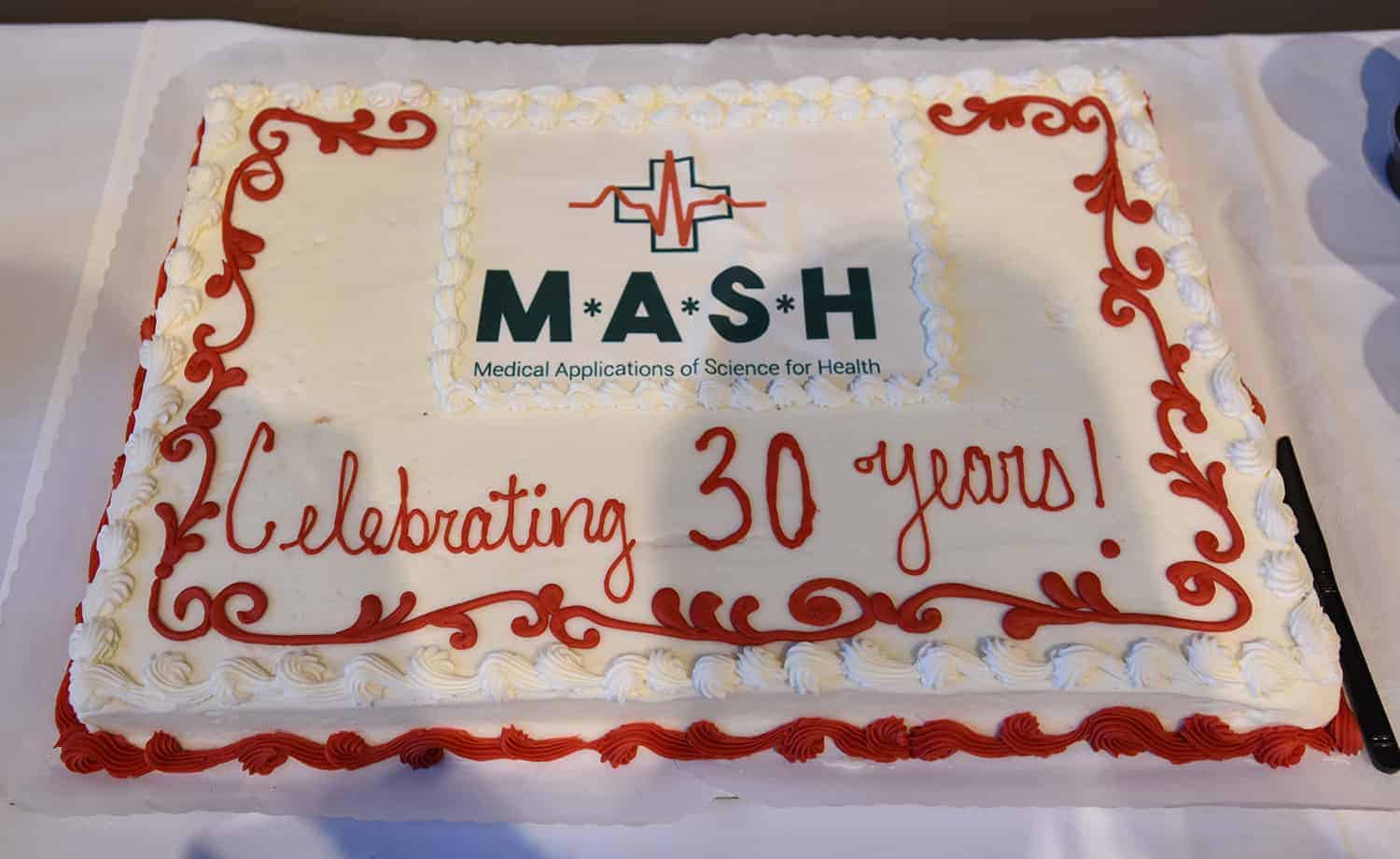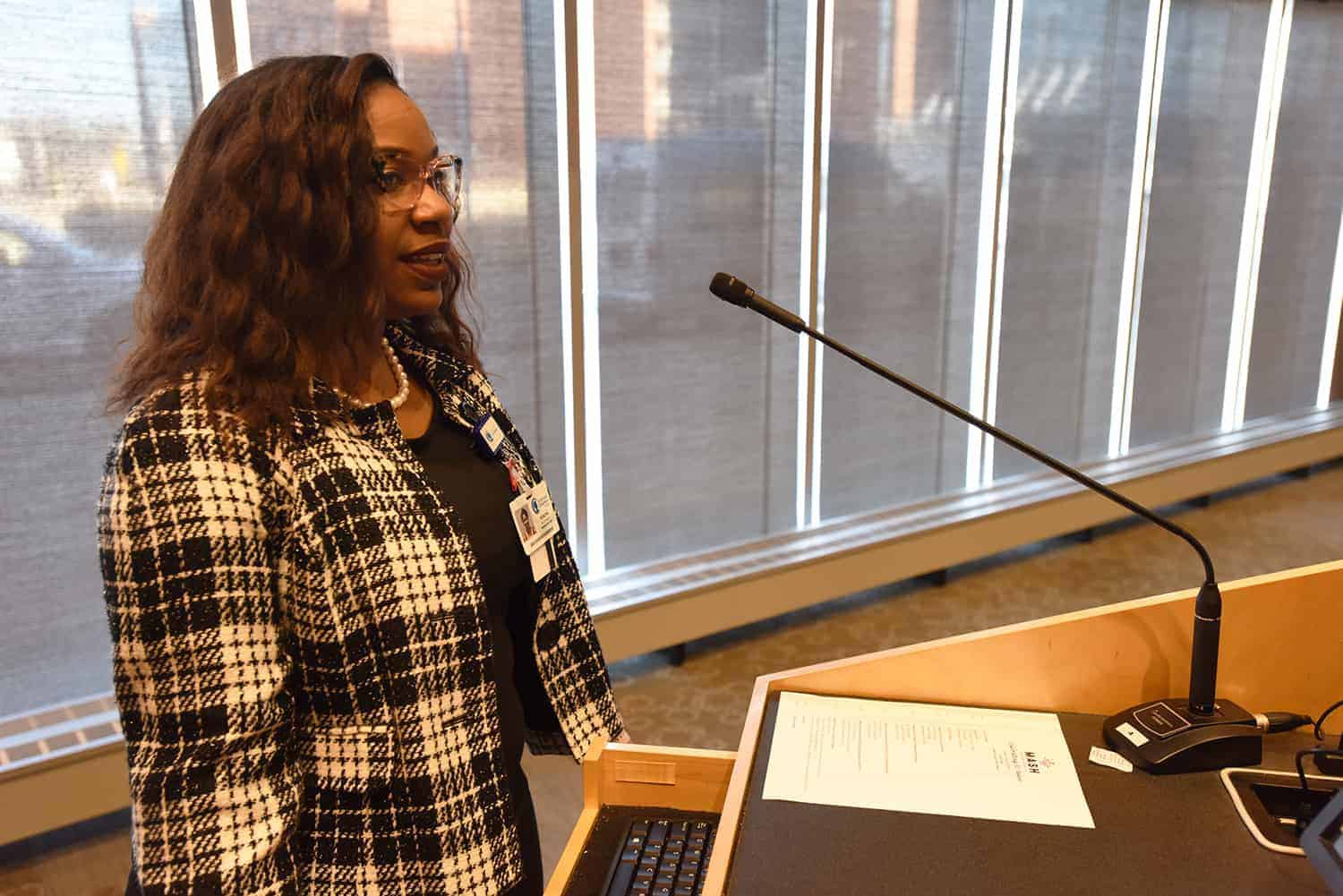Feb. 1, 2018 | Students, graduates and supporters were in a festive mood as they gathered Jan. 26 to celebrate the 30th anniversary of the UAMS MASH program, which seeks to spark young people’s interest in the health care field.
MASH (Medical Applications of Science for Health) is a two-week summer enrichment program that allows rising high school juniors and seniors to shadow health professionals and attend workshops that enhance their experience in the health care field.

The program, begun by UAMS in 1988 in Pine Bluff, is the oldest of its kind in the nation. The program is held at UAMS regional campuses, community hospitals and colleges around the state.
“The MASH program is a pipeline that greatly supports UAMS in recruiting and training health care professionals for the state of Arkansas,” said Sterling Moore, vice chancellor for Regional Campuses. “The success of this program would not be possible without the support of our key community partners, who clearly have a vested interest in ensuring that the health care workforce needs of Arkansas are being met.”
A celebration was held at noon in the hospital gallery. Attendees sat at round tables draped with white linen, enjoyed a catered lunch, and reminisced about their experiences in the program. A large white sheet cake emblazoned with the MASH logo was saved until last.
Robin Howell, program manager for Regional Campuses, helped write the grant that created the first MASH program three decades ago. “It’s been an amazing journey,” she said.
Approximately 500 students participate in the program each summer. The goal is to entice more students into the health care professions, where shortages are common and are expected to grow.
Since its inception, MASH has encouraged more than 9,000 students to pursue careers in health care. Of those, 542 have enrolled in one of UAMS’ five colleges or the graduate school, and many more have gone on to rewarding health care careers, Howell said.
Thirty percent of the College of Medicine’s entering classes the last two years were students who either participated in MASH or were mentored by regional recruiters, Howell said.
Howell thanked each MASH recruiter and asked them to stand and be recognized. “The impact that they have on these students is obvious,” she said.

MASH covers plenty in two weeks. Students selected into the program shadow in a variety of health care locations and learn medical terminology. Through hands-on activities, they learn medical procedures such as CPR and gain insight into multiple disciplines, with a focus on interprofessional education. The program includes a tour of the UAMS main campus, several local field trips, and teambuilding activities.
“The MASH program connected those dots for me,” said Kendra McCraney, a 2008 participant who is now
in the cardio-respiratory care program in the UAMS College of Health Professions. “It’s an awesome feeling to know that I can go back into my community and improve or make something better for someone else.”
Surveys conducted by UAMS show that students who attend MASH have a high rate of continuing their education in the medical field, with 95 percent more likely to pursue a health career. Perhaps more importantly, MASH participants are more likely to work in primary care and in rural and medically underserved areas of the state, where MASH does much of its recruiting.
“A lot of times, when they go to MASH, that’s when the light comes on,” Howell said. “That’s when they get excited – that’s when they say, ‘Yes! This is what I really want to do.’”
MASH is free for students thanks to community support and partnerships with Arkansas Farm Bureau, Blue Cross/Blue Shield, and Baptist Health, among others.
Arkansas Farm Bureau was recognized for 25 years of significant support of the MASH program. Moore presented Farm Bureau Executive Vice President Warren Carter with a commemorative plaque.
“We get our direction for everything we do from county leaders – and they’ve told us that the MASH program is a priority,” Carter said. “We plan to support this program for many, many years to come. Thank you for allowing this program to be what it is. It’s important to our rural communities, to Farm Bureau members, and to our state as a whole.”
Vic Snyder, M.D., corporate medical director for external affairs with Arkansas Blue Cross and Blue Shield, spoke about his own experience pursuing a medical career, and how programs like MASH help students from rural areas make connections.
“This kind of program is really, really important, and it will help Arkansas as a lot of the kids go back into those areas,” he said.
The MASH program was recently awarded a $65,000 grant from the Blue & You Foundation to further expand its reach. Arkansas Blue Cross and Blue Shield established the Blue & You Foundation in 2001 as a charitable foundation to promote better health in Arkansas.
Mark Jansen, M.D., associate professor in the College of Medicine Department of Family and Preventive Medicine and medical director for Regional Campuses, said that MASH is there to provide guidance to the age-old question: what do you want to be when you grow up?
“We’ve got a lot of health challenges coming up, and we have those challenges magnified in the rural areas,” Jansen said. “That is where the mission of Regional Campuses, and the success of the MASH program dovetail so nicely.”
